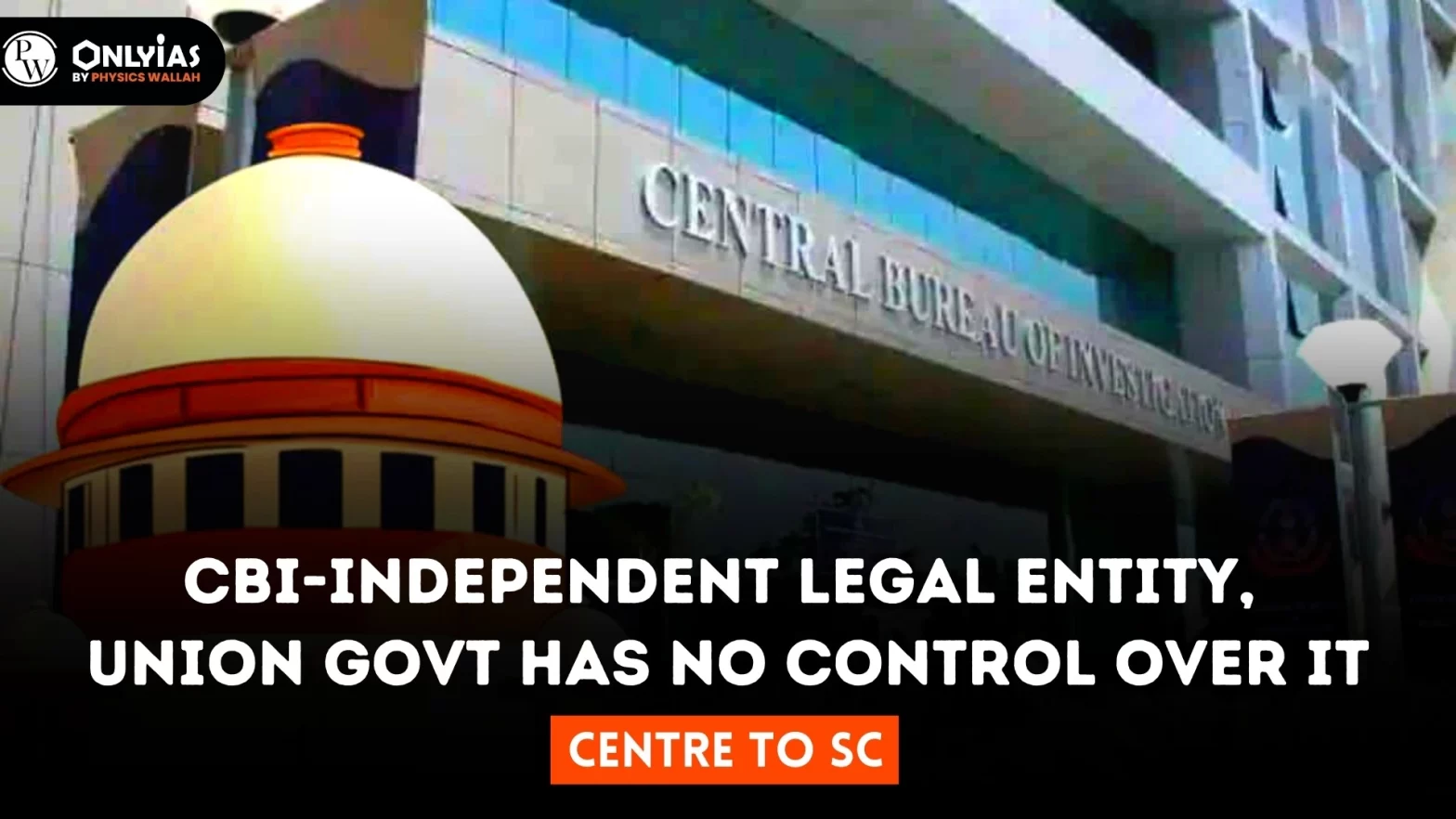Context:
- Recently, the Centre urged the Supreme Court to reject West Bengal’s petition against the CBI. It has argued that the Central Bureau of Investigation is an “independent legal entity” and is not under the direct “control” of the Union government.
West Bengal V/s Central Bureau of Investigation
- West Bengal Government Initiates Article 131 Suit Against Centre: The West Bengal government has filed an original suit in the apex court against the Centre under Article 131 of the Constitution, alleging that the central agency has been filing FIRs and proceeding with investigations despite the state having withdrawn the general consent.
- Withdrawal of General Consent: West Bengal’s Allegations of CBI Overreach: The West Bengal government withdrew the ‘general consent’ accorded to the CBI to conduct probe and raids in the state on November 16, 2018.
| Article 131 of the Constitution empowers a state to move the Supreme Court directly in case of dispute with the Centre or any other state. |
About Central Bureau of Investigation (CBI)
- The CBI is the premier investigating police agency estbalished based on the recommendation of Santhanam Committee.
- The CBI is not a statutory body It derives its powers from the Delhi Special Police Establishment Act, of 1946.
- Legal Framework: It functions under the superintendence of the Dept. of Personnel, Ministry of Personnel, Pension & Public Grievances, Government of India.
- Multidisciplinary Focus: Multidisciplinary agency investigating corruption, economic offenses, and conventional crimes.
- The CBI acts as the “National Central Bureau” of Interpol in India.
- The CBI is governed by (the DSPE) Act of 1946, which requires the investigative agency to obtain the consent of state governments before it can investigate a crime in a particular state.
What is General Consent?
- Form of consent: Consent given by a state government to the Central Bureau of Investigation can come in two forms, either case-specific, or ‘general’.
- General consent: It allows the CBI to operate seamlessly within states.
- Case-specific consent: In contrast, if the CBI does not have the general consent of a state government, it is required to apply for consent on a case-by-case basis and cannot act before the consent is given.
- Impact of Withdrawal:
- Restriction of Fresh Cases: Withdrawal of general consent also means that the CBI will not be able to register any fresh case involving central government officials or private persons in a particular state without prior permission of that state government.
- Continued Investigations: The CBI can continue to investigate cases in a state registered before the withdrawal of general consent.
- Legal Precedent:
- In a case related to illegal coal mining and cattle smuggling, the Calcutta High Court ruled that the CBI cannot be stopped from investigating a central government employee in another state.
What challenges does the Central Bureau of Investigation (CBI) face in its functioning?
- Caged Parrot: In the words of the Supreme Court in the Hawala case, the CBI “is a caged parrot speaking in its master’s voice”, due to its excessive political interference irrespective of which party happened to be in power at the time.
- The functioning of the CBI figured prominently in the Jain hawala, 2G scam, coal scam, and other prominent cases in which it had repeatedly come in for adverse notice.
- Violation of Constitution and Federal Principle: Law and order, and Police is State subject under the seventh schedule of the Constitution.
- Assam High Court had even given a verdict on 6 November 2013 that CBI is unconstitutional and does not hold a legal status.
- However, in an appeal filed against the said judgment, the Supreme Court stayed this verdict and the same is pending disposal before the Supreme Court.
- Not Independent: The agency depends on the home ministry for staffing since many of its investigators come from the Indian Police Service. The agency depends on the law ministry for lawyers and also lacks functional autonomy to some extent.
- The CBI, run by IPS officers on deputation, is also susceptible to the government’s ability to manipulate the senior officers because they depend on the Central government for future postings.
- Political Misuse: Misuse of the CBI to settle political scores has largely been responsible for the state government’s withdrawal of general consent and opposition to enacting a Central law for the CBI.
- Opposition parties are accusing it as a pliant tool of the government for harassing and intimidating their leaders and whitewashing cases where leaders of the ruling party are involved.
- In the recent past, Eight states have withdrawn ‘general consent’ to the CBI, namely, Telangana, Maharashtra, Punjab, Rajasthan, Jharkhand, Chhattisgarh, Kerala and Mizoram.
- Structural Issues and Inefficiencies
- Acute shortage of personnel is a major cause of the shortfall in the government’s sheer mismanagement of CBI’s workforce, through a system of inefficient, and inexplicably biased, recruitment policies.
- The public fight between two top officers of the CBI — former director Alok Verma and special director Rakesh Asthana — exposed the premier probe agency to ridicule.
- Credibility and Public Trust: CBI has been criticized for its mismanagement of several cases involving prominent politicians and mishandling of several sensitive cases like the Bofors scandal, the Bhopal gas tragedy, the Arushi murder case and the Nithari Serial murder case, etc
- It has been accused of enormous delays in concluding investigations due to political inertia.
SC Led Structural Changes: The landmark judgement in Vineet Narain v. Union of India in 1997 laid out several steps to secure the autonomy of CBI.
- The CBI director shall have a “minimum tenure of two years, regardless of the date of his superannuation”.
- The Central Vigilance Commission (CVC), “shall be responsible for the efficient functioning of CBI”.
- The CVC chief shall be selected by a panel comprising the prime minister, home minister and the opposition leader from a panel of “outstanding civil servants”.
- It further stated that the “transfer of an incumbent Director, CBI in an extraordinary situation, including the need for him to take up a more important assignment, should have the approval of the selection committee”.
- This committee comprises the PM, the leader of the Opposition and the CJI.
|
Also Read: CVC Report On Corruption
Way Forward
- Independent Legal Entity: As long as the government has the power to transfer and post officials of its choice in the CBI, the investigating agency will not enjoy autonomy and will be unable to investigate cases freely.
- It should be granted more autonomy by making it accountable only to the Parliament like the office of CAG and the Election Commission.
- Granting Statutory status: Separate enactment under – “Central Bureau of Intelligence and Investigation Act” and replacing DSPE Act.
- In 1978, the L P Singh committee recommended enactment of a “comprehensive central legislation to remove the deficiency of not having a central investigative agency with a self-sufficient statutory charter of duties and functions”.
- The Second Administrative Reforms Commission (2007) also recommends that “a new law should be enacted to govern the working of the CBI”.
- Establishing Independent Cadre: One of the demands in line with international best practices, is for the Central Bureau of Investigation to develop its own dedicated cadre of officers who are not bothered about deputation and abrupt transfers.
- The process of direct recruitment through UPSC which was stopped in 2000 can be restarted.
- Ensuring Fixed Tenure for Directors: The current system of appointing CBI directors for a fixed term of two years, with the possibility of extension, can create uncertainty and make them vulnerable to political influence. A five-year fixed tenure, without the option of extension, would provide greater stability and independence.
- The directors should be ineligible for any appointment by the Central and state governments.
- Strengthening Parliamentary Oversight: A more efficient parliamentary oversight over the federal criminal and intelligence agencies could be a way forward to ensure better accountability, despite concerns regarding political misuse of the oversight.
- The 24th Report of the Department-related Parliamentary Standing Committee on Personnel, Public Grievances, Law and Justice, released in 2018, made several recommendations for CBI reform.
- These include strengthening human resources, improving infrastructure and financial resources, granting additional powers, and enhancing administrative empowerment with accountability. Implementing these recommendations would address several critical operational challenges faced by the Central Bureau of Investigation.
Conclusion:
Addressing structural problems in the Central Bureau of Investigation, ensuring its independence, and making necessary improvements are crucial for making the investigative agency trustworthy and effective in upholding the law in India.
To get PDF version, Please click on "Print PDF" button.

